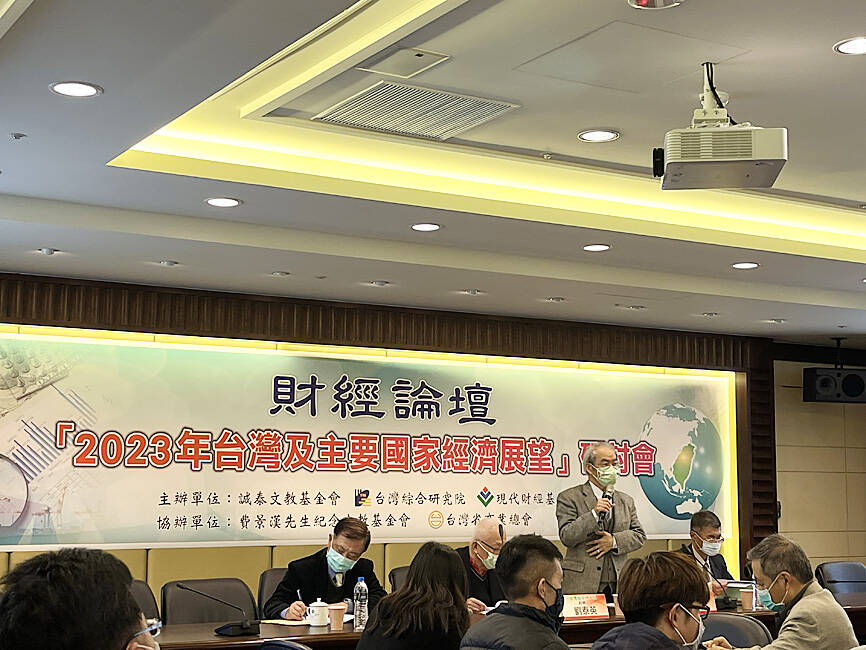Economic growth is expected to moderate to 2.51 percent next year after expanding by an estimated 3.01 percent this year, as global demand for Taiwanese exports further slows amid high inflation and drastic monetary tightening, the Taiwan Research Institute (TRI, 台灣綜合研究院) said yesterday.
“The global economic scene looks pessimistic going forward, as the war in Ukraine drove up global fuel prices and prompted major central banks to hike interest rates to tame inflation,” institute founder Liu Tai-ying (劉泰英) said.
The twists have dashed hopes of a continued recovery from the COVID-19 pandemic this year, as evidenced by the fast retreat in the nation’s exports, the New Taipei City-based institute said.

Photo: Hsu Tzu-ling, Taipei Times
The growth projections for this year and next year made TRI the most conservative among major local think tanks.
The world is now heading toward a recession, which is unfavorable to Taiwanese exporters of electronics used in smartphones, notebook computers, wearables, TVs and vehicles, it said.
That means private consumption would take over as the main driver of growth, expanding 5.14 percent next year after estimated growth of 3.27 percent this year, institute president Wu Tsai-yi (吳再益) said.
Private investment would increase a modest 2.48 percent, from an impressive 7.24 percent gain this year, as major companies cut or postpone capital expenditure to deal with order cancelations and soft end-market demand, Wu said.
Both tech and non-tech manufacturers are giving top priority to inventory adjustments, which might need more time than expected, as downside risks abroad heighten, he said.
Interest rates would remain high even if global central banks were to slow the pace of tightening, the institute said, adding that China’s lingering COVID-19 restrictions would continue to inhibit economic activity even though it has displayed some flexibility.
China’s slowdown is to blame for the double-digit percentage-point decline in Taiwan’s exports last month, the Ministry of Finance said last week, adding that it might not improve this quarter and in the first half of next year.
The institute is expecting a 1.96 percent increase in consumer prices next year, below the central bank’s target of at most 2 percent.
Exports of goods and services are forecast to grow 3.37 percent next year, slower than imports’ projected increase of 5.44 percent, the institute said.
The New Taiwan dollar would trade at an average of NT$30.79 percent against the US currency, weakening from NT$29.83 this year, it predicted.

CHIP WAR: Tariffs on Taiwanese chips would prompt companies to move their factories, but not necessarily to the US, unleashing a ‘global cross-sector tariff war’ US President Donald Trump would “shoot himself in the foot” if he follows through on his recent pledge to impose higher tariffs on Taiwanese and other foreign semiconductors entering the US, analysts said. Trump’s plans to raise tariffs on chips manufactured in Taiwan to as high as 100 percent would backfire, macroeconomist Henry Wu (吳嘉隆) said. He would “shoot himself in the foot,” Wu said on Saturday, as such economic measures would lead Taiwanese chip suppliers to pass on additional costs to their US clients and consumers, and ultimately cause another wave of inflation. Trump has claimed that Taiwan took up to

A start-up in Mexico is trying to help get a handle on one coastal city’s plastic waste problem by converting it into gasoline, diesel and other fuels. With less than 10 percent of the world’s plastics being recycled, Petgas’ idea is that rather than letting discarded plastic become waste, it can become productive again as fuel. Petgas developed a machine in the port city of Boca del Rio that uses pyrolysis, a thermodynamic process that heats plastics in the absence of oxygen, breaking it down to produce gasoline, diesel, kerosene, paraffin and coke. Petgas chief technology officer Carlos Parraguirre Diaz said that in

Japan intends to closely monitor the impact on its currency of US President Donald Trump’s new tariffs and is worried about the international fallout from the trade imposts, Japanese Minister of Finance Katsunobu Kato said. “We need to carefully see how the exchange rate and other factors will be affected and what form US monetary policy will take in the future,” Kato said yesterday in an interview with Fuji Television. Japan is very concerned about how the tariffs might impact the global economy, he added. Kato spoke as nations and firms brace for potential repercussions after Trump unleashed the first salvo of

SUPPORT: The government said it would help firms deal with supply disruptions, after Trump signed orders imposing tariffs of 25 percent on imports from Canada and Mexico The government pledged to help companies with operations in Mexico, such as iPhone assembler Hon Hai Precision Industry Co (鴻海精密), also known as Foxconn Technology Group (富士康科技集團), shift production lines and investment if needed to deal with higher US tariffs. The Ministry of Economic Affairs yesterday announced measures to help local firms cope with the US tariff increases on Canada, Mexico, China and other potential areas. The ministry said that it would establish an investment and trade service center in the US to help Taiwanese firms assess the investment environment in different US states, plan supply chain relocation strategies and